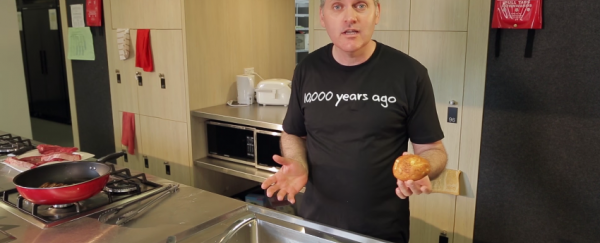Have you ever stopped and wondered why humans are such foodies? Obviously all animals need food, but Homo sapiens have taken things to the next level, by growing, preparing, flavouring and cooking our food in weird and wonderful ways not seen anywhere else in the animal kingdom - we're looking at you, Heston Blumenthal. But, as the latest episode of the University of New South Wales' (UNSW) "How Did We Get Here?" explains, there's actually a very good reason we're so into messing with our food, and it's allowed us to evolve into the dominant species we are today.
As UNSW evolutionary biologist Darren Curnoe explains in the episode above, it all started when our ancestors started cooking their meat as far back as a million years ago. This process not only made our food safer to eat by eliminating parasites and bacteria, it also made it easier to digest and chew, allowing humans to evolve smaller teeth and less jaw strength, and making room for us to develop larger brains.
It also made us less dependent on eating. In their raw state, many vegetables contain little nutrition, and a lot of root vegetables, such as potatoes, can't be digested at all. By unlocking more nutrients through cooking, our ancestors were able to get a lot more energy out of less food, allowing them to more or less survive on three meals a day - something that our raw food-eating chimpanzee relatives would never be able to do, Curnoe explains.
But we probably don't have to tell you that the biggest change came with farming. We're the only species who grow our own food, and this allowed humans to start focussing on new trades and indulging in interesting ways to improve the taste and texture of our meals.
This also had some pretty profound effects on our bodies, but we'll let Curnoe explain that in the episode above because seeing these changes is much more impressive than reading about them. It's pretty crazy to think our relationship with food hasn't just been crucial to our evolution, it's also become a quintessential part of what it means to be human. We'll never look at pizza in the same way again.
Love science? Find out more about the world-changing research happening at UNSW.
